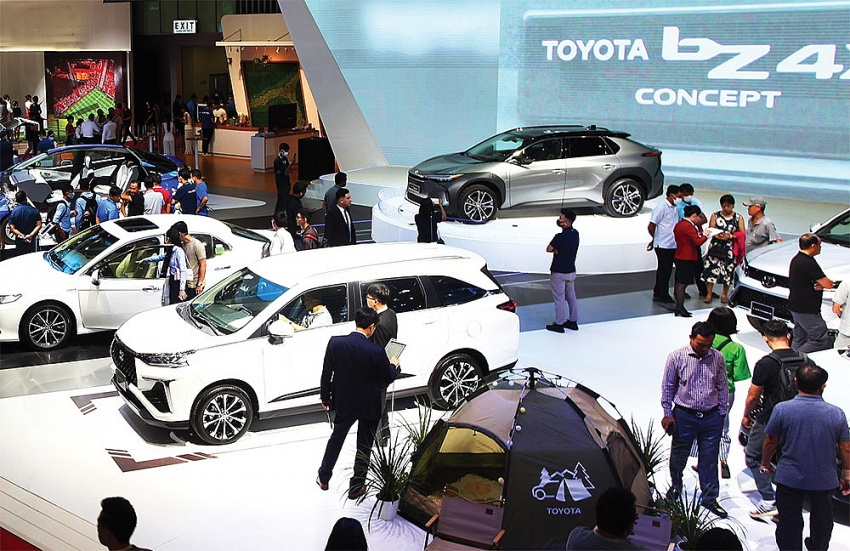Car-buying habits in Vietnam leaning towards import models
 |
| Traditionally, assembled cars are in the lead in sales over imported vehicles in Vietnam, photo Le Toan |
According to a Vietnam Automobile Manufacturers’ Association (VAMA) report released last week, the sales volume in May reached almost 25,800 vehicles, including 18,230 passenger cars, nearly 7,300 commercial vehicles, and 267 specialised vehicles.
Sales of completely built up (CBU) cars increased over the last five months, while assembled car output slowed down.
The sales volume of domestically assembled cars reached almost 12,000 cars, up only 0.02 per over the previous month, while the sales volume of imported CBU cars was over 13,800 cars, up 12 per cent over the last month. This was the second consecutive month that the consumption of imported cars has surpassed domestically assembled vehicles.
This is considered unusual in the domestic car market, where assembled cars often overwhelm imported cars in terms of sales volume through each reporting period.
VAMA sales data shows that since 2021, there have only been five occasions that Vietnamese customers have bought more CBU cars than completely knocked down (CKD) cars.
Economist Ngo Tri Long said that amid a difficult economic context demand was slowing, and the race to reduce prices was taking place loudly, along with a glut of information about sales incentives from policies, causing the trend of choosing cars to change.
“The fact that many imported car models receive incentives and discounts from distributors that are more attractive than domestically assembled cars is an issue. Besides this, customers have tightened budgets due to the pressure of rising inflation, exchange rates, and interest rates,” he said.
The Ministry of Finance (MoF) noted that the automobile market and the entire economy would face negative impacts this year due to the global crisis and geopolitical conflict. Production and business activities of enterprises will continue to be difficult. Automobile production and assembly will face economic recession, causing sales to decline, and many enterprises will have to reduce output. Rising inflationary pressures, currency rates, and interest rates, in particular, have an impact on consumer psychology, causing them to cut back on high-value purchases.
According to the MoF, the government needs to support domestic vehicle manufacturing and assembling enterprises, and the ministry has proposed to extend the deadline for paying special consumption tax for domestically produced or assembled cars. If the proposal is approved, this will be the fifth time in the past four years that the special consumption tax on domestically produced and assembled cars has been applied.
Last year, this policy was also applied to support domestic businesses, with deferred tax payments of nearly VND8.1 trillion ($337.5 million).
During the National Assembly session earlier this month, Deputy Prime Minister Tran Hong Ha announced a plan on a decree reducing registration fees for domestically produced and assembled cars. Although details of the period and specific discounts have not been announced, the tradition of a 50 per cent discount as in previous promotions may come into effect.
This would be the fourth consecutive year that the preferential registration fee policy has been implemented. If approved, local automakers hope it will be applied from July 1 and last until the end of the year.
 | Vietnam's car market saw May rebound A report by the Vietnam Automobile Manufacturers’ Association (VAMA) has revealed that automakers experienced a slight recovery in sales in May after a decline in April. |
What the stars mean:
★ Poor ★ ★ Promising ★★★ Good ★★★★ Very good ★★★★★ Exceptional
 Tag:
Tag:
Related Contents
Latest News
More News
- Kurz Vietnam expands Gia Lai factory (February 27, 2026 | 16:37)
- SK Innovation-led consortium wins $2.3 billion LNG project in Nghe An (February 25, 2026 | 07:56)
- THACO opens $70 million manufacturing complex in Danang (February 25, 2026 | 07:54)
- Phu Quoc International Airport expansion approved to meet rising demand (February 24, 2026 | 10:00)
- Bac Giang International Logistics Centre faces land clearance barrier (February 24, 2026 | 08:00)
- Bright prospects abound in European investment (February 19, 2026 | 20:27)
- Internal strengths attest to commitment to progress (February 19, 2026 | 20:13)
- Vietnam, New Zealand seek level-up in ties (February 19, 2026 | 18:06)
- Untapped potential in relations with Indonesia (February 19, 2026 | 17:56)
- German strengths match Vietnamese aspirations (February 19, 2026 | 17:40)






















 Mobile Version
Mobile Version